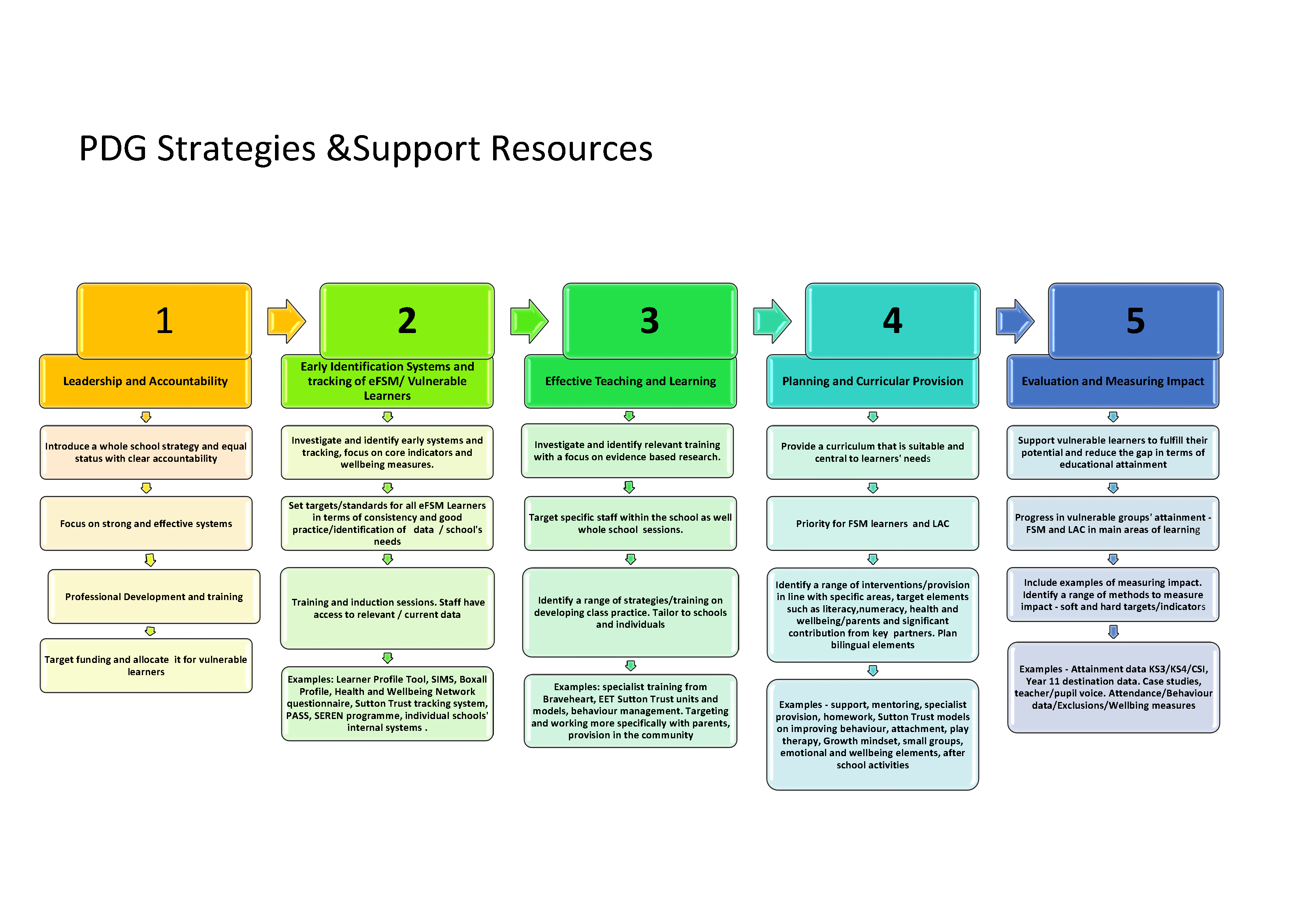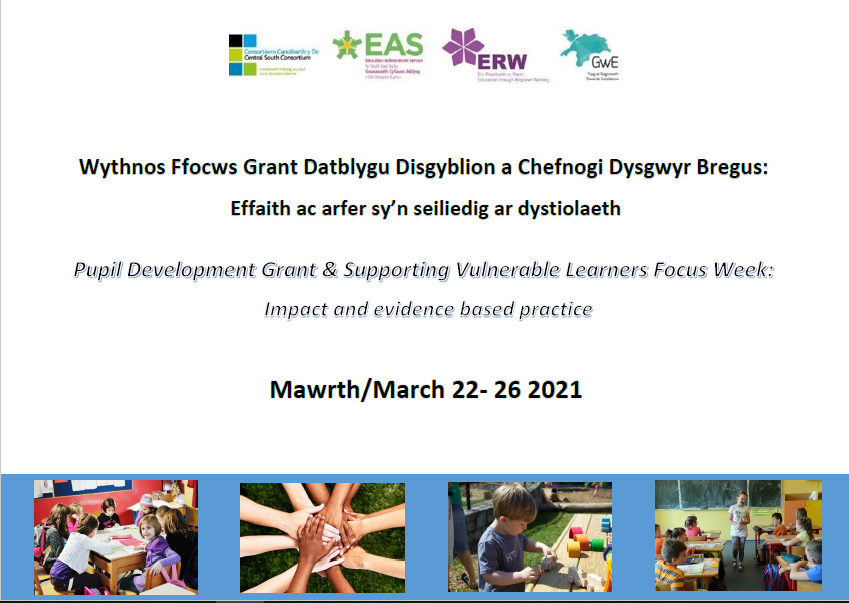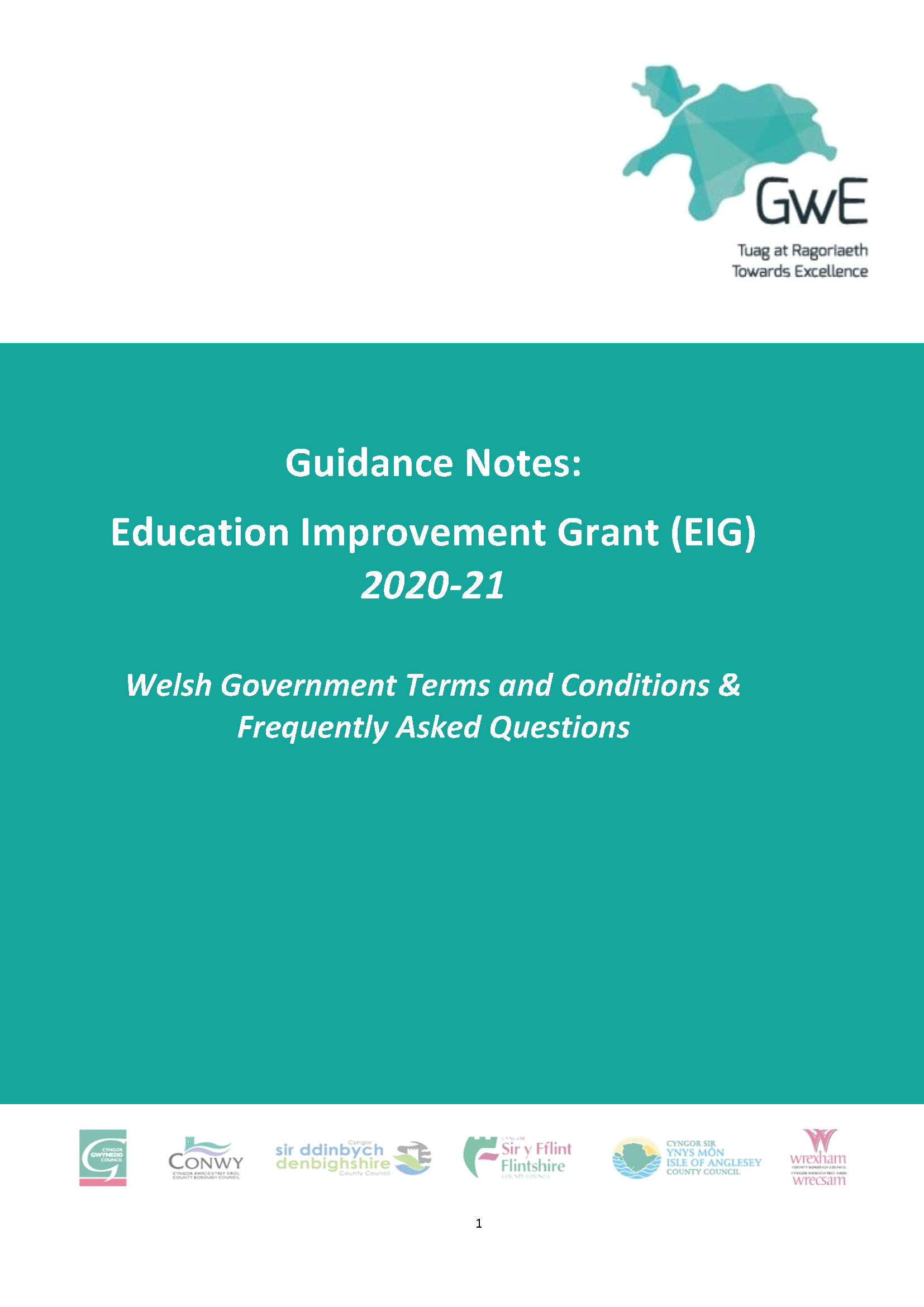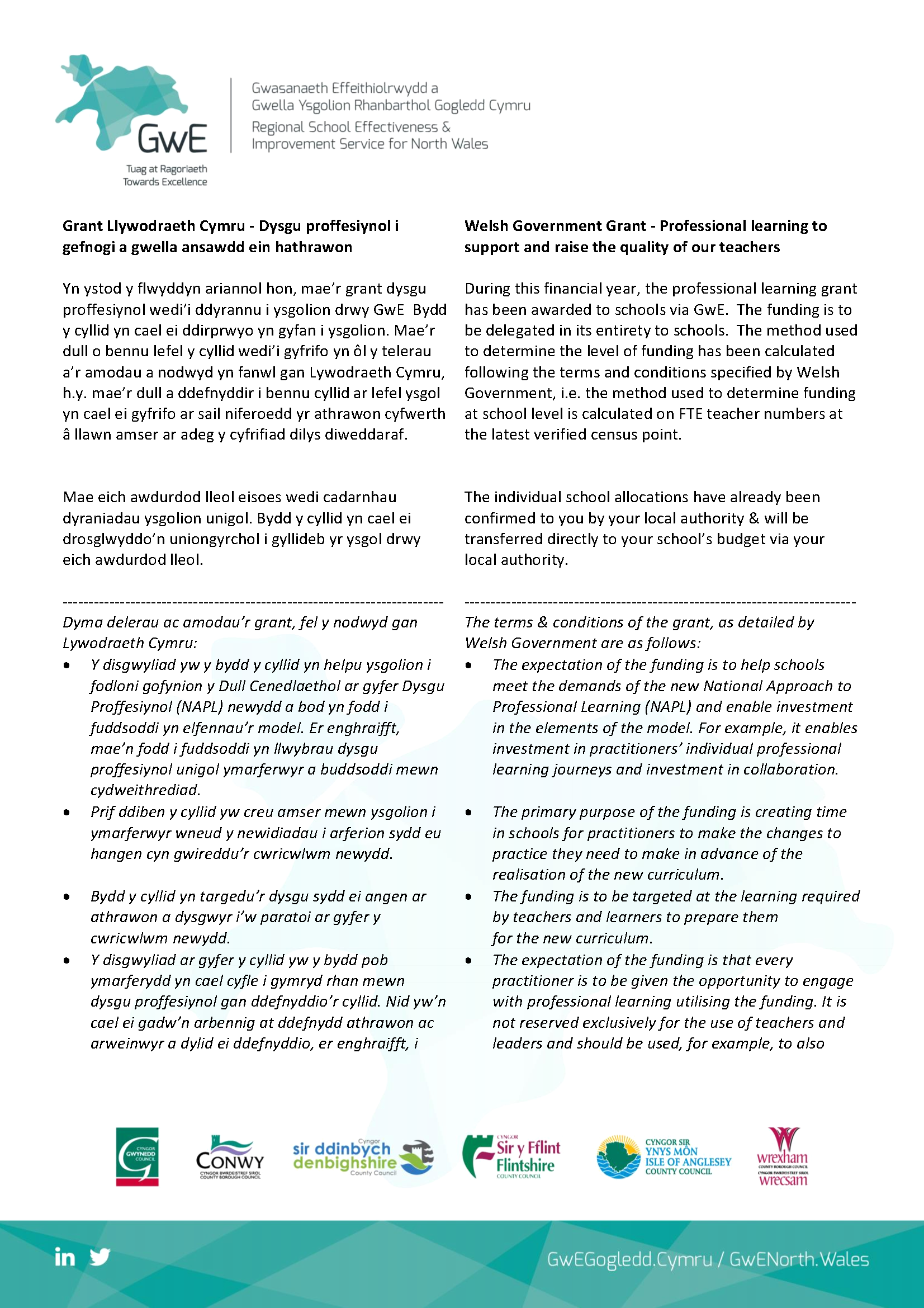Welsh Government Grants Information [2020-2021]
Education Improvement Grant
EIG 2020-2021
Guidelines state that the Education Improvement Grant has to be at least 80% delegated to schools.
Following the decision of the 6 local authorities, we have now finalised the figures for the GwE region and I am pleased to inform you that schools will receive a minimum of 90.03% of the EIG.
You will have already received confirmation of the amount your school will receive from your local authority finance team (this will be transferred directly into your school budgets).
In addition to this, a further 5.29% of the budget is committed to direct provision in targeted schools (e.g. language coordinators) and is being managed by the local authorities. A further 0.72% is currently allocated to local authorities in order to deliver targeted activities locally whilst a final 3.27% is allocated to the support of the statutory Induction of NQTs, along with funding for regional priorities in providing targeted support for Literacy and Numeracy & the regional coordination of the Foundation Phase – all being delivered by GwE. That leaves a final 0.69% for GwE and the Authorities to administer the Grant.
Welsh Government guidance for regional consortia and Local Authorities clarifies that individual school-level grant spending plans are not required and that “..Consortia Challenge Advisers will provide support and challenge to schools to ensure their school development plans appropriately reflect their improvement journey and expected outcomes in line with the grant terms and conditions and consortia business plans.” There is a clear expectation for schools to “provide a breakdown of their Education Improvement Grant for Schools allocation in their school development plan.”
In order to support schools in complying with this expectation, we have put together the attached table which lists the range of “grant purposes” and, therefore, the categories of eligible expenditure.
In order to support schools in complying with this expectation, a section has been developed on the Grants Planning Dashboard.
For all grant funding apart from the Foundation Phase, you have flexibility to allocate it in accordance with the need you have identified via your self-evaluation and in order to progress any relevant activities you have identified in your School Development Plan.
Schools are required to upload their school development plan to G6 and complete the relevant section of the Grants Planning Dashboard.
A Frequently Asked Questions document has been developed and is available on the Grants Planning Dashboard & on G6.
If you have any queries about the EIG, please contact the following in the first instance:
- For any queries regarding the allocation of funding and how you should access it, please contact the finance team in your local authority;
- For any queries relating to eligible spend activities, monitoring and evaluating the effectiveness of your EIG funded activities in terms of improved learner outcomes, please contact your school’s allocated Supporting Improvement Adviser.
Downloads:
Pupil Development Grant
PDG 2020-2021
The PDG should be used to support the needs of all children who are or have been eFSM in the previous two years or are looked after. The PDG is intended to provide support to disadvantaged learners to overcome the additional barriers that prevent those from disadvantaged backgrounds achieving their full potential.
USEFUL LINKS
WELSH GOVERNMENT:
Guidance and Services: Education of disadvantaged children
DOCUMENTS TO DOWNLOAD
 |
 |
|
|
 |
PDG Guidance |
PDG Framework |
PDG Review and Monitoring Questions |
PDG Successful Practise Checklist |
Professional Learning Grant
Professional Development Grant 2020-2021
During this financial year, the professional learning grant has been awarded to schools via GwE. The funding is to be delegated in its entirety to schools. The method used to determine the level of funding has been calculated following the terms and conditions specified by Welsh Government, i.e. the method used to determine funding at school level is calculated on FTE teacher numbers at the latest verified census point.
The individual school allocations have already been confirmed to you by your local authority & will be transferred directly to your school’s budget via your local authority.
The terms & conditions of the grant, as detailed by Welsh Government are as follows:
- The expectation of the funding is to help schools meet the demands of the new National Approach to Professional Learning (NAPL) and enable investment in the elements of the model. For example, it enables investment in practitioners’ individual professional learning journeys and investment in collaboration.
- The primary purpose of the funding is creating time in schools for practitioners to make the changes to practice they need to make in advance of the realisation of the new curriculum.
- The funding is to be targeted at the learning required by teachers and learners to prepare them for the new curriculum.
- The expectation of the funding is that every practitioner is to be given the opportunity to engage with professional learning utilising the funding. It is not reserved exclusively for the use of teachers and leaders and should be used, for example, to also enable access to professional learning for teaching assistants.
- The funding is not exclusively reserved for support of teachers and leaders and is to be used to support all practitioners who support teaching and learning in classrooms including TAs/LSAs.
- The funding should be utilised to support engagement with the regional professional learning offer, or a professional offer, for example an HEI, or to support professional learning collaboration across schools.
In line with this, the funding should be used to support areas such as:
- the general release of teachers and TAs to engage in professional learning activities;
- the remuneration of individuals, creating roles and posts, to support the co-ordination of PL activities across a school or group of schools. These roles would support colleagues, departments or whole school approaches to critical enquiry, change management and SLO activities;
- the release costs for practitioners to engage in research activities and critical enquiry, funding release time to investigate the implications of the new curriculum for their own teaching and assessment practice;
- the release costs to enable practitioners to collaborate both within school and across clusters and networks of schools – engaging with collaborative professional learning and collaborative planning;
- supporting the development of the roles such as school (or cluster level) Professional Learning Coach.
There is an expectation that schools will maximise the efficacy of the funding by pooling their resources appropriately across clusters/structured networks to maximise the impact and level of funding.
Monitoring requirements by Welsh Government
Schools should publish their Professional Learning plans (either on a school or cluster level) outlining how they plan to support the professional learning needs of all practitioners within their schools and report annually report against those plans (again publishing a short report on their web-site).
Supporting Improvement Advisers within the regions should work alongside schools to consider the plans and in essence sign off to confirm that the plan meets the needs.
In order to support schools in complying with this expectation, a section has been developed on the Grants Planning Dashboard
Schools are required to upload their school development plan to G6 and complete the relevant section of the Grants Planning Dashboard.
A Frequently Asked Questions document has been developed and is available on the Grants Planning Dashboard & on G6.
If you have any queries about this funding, please contact the following in the first instance:
- For any queries regarding the allocation of funding and how you should access it, please contact the finance team in your local authority;
- For any queries relating to eligible spend activities, monitoring and evaluating the effectiveness of the spend, please contact your school’s allocated Supporting Improvement Adviser.
Downloads:
Recruit, Recover, Raise Standards: Accelerated Learning Programme
Accelerating Learning Programme
The expectation of the funding is to help schools meet the demands of the Recruit, Recover, Raise Standards: Accelerating Learning Programme as announced by the Minister for Education on the 9 July 2020.
During the crisis, it has become clear that many learners have not progressed as much as they might in terms of their progress in learning, some learners having been impacted more seriously than others have. This funding enables investment in schools to allow them to recruit and deploy additional human capacity to support learners in addressing their needs following the initial COVID-19 crisis and period of school closure.
The primary purpose of the funding is therefore to enable investment in schools to allow them to recruit and deploy additional human capacity to support learners in addressing their needs following the initial COVID-19 crisis and period of school closure.
All pupils are eligible for additional help when they return to school in September, although the scope of the help needed will vary significantly depending on individual circumstances. Given that resources are limited, we will prioritise in the following way when planning the allocation of resources:
Priority Cohorts for Support:
The funding is to be targeted at specific cohorts identified as most at risk as follows:
- Pupils preparing for examinations in the forthcoming academic year (that is those learners in years 11, 12 and 13)
- Vulnerable and disadvantaged children, as defined by a range of approaches
- Year 7, because of the disruption to the transition from primary to secondary schools
These specific cohorts are an indication of how heads will think about the deployment of support. The expectation of the funding is that is that, although the funding formula is based on specific learner cohorts, learners who are identified as in need of support are given the opportunity to engage with support where possible. It is therefore not reserved exclusively for the use of the three priority groups listed at points 1-3 and should be used to enable access to support where needed for children who have been impacted by a wide range of aspects of the pandemic
As there will be individuals not in the 3 listed priority groups who also need support, it is an important principle that Head Teachers have autonomy in deciding any further groups or individuals that they support as part of their individual school plans.
Areas of Support to be Provided:
Curriculum reform remains our central priority for education in Wales. As such the foci for support under this Programme are:
- Literacy, numeracy and digital competence within a broad and balanced curriculum – for the examination years, this will include higher order reading and writing skills, high level mathematics where relevant, and digital competence at the appropriate level and as relevant to learners progressing with their qualifications
- Development of independent learning skills, to enable and motivate learners in all groups to make accelerated progress by working more effectively alone and out of school
- Support and engagement through coaching – this in recognition that the most disengaged learners will need coaching and emotional support as well as support for examination preparation and skills
What the Funding Should be Used to Provide:
This grant dedicates financial resources to the creation of new capacity in the education system.
- Schools may appoint Qualified Teachers including NQTs, Teaching Assistants and other supporting roles to the school (for example roles designed to provide coaching support), in line with the school’s understanding of its learners needs
- The new capacity may be full time or part time, or an increase in hours for an existing contract where those skills are necessary
- The new colleagues might work across more than one school where clusters of schools are working in a collaborative partnership
- Head teachers may appoint new teachers to the school in order to release existing teachers who know their pupils best to work with them to accelerate their progress (backfilling their usual positions on a temporary basis)
- The skill-sets of new colleagues will need to reflect the needs of groups and learners
- The delivery model within which new colleagues work will be specific to the needs of the school and its learners
The funding is not eligible to be used for the purchase of equipment, including ICT devices, or any form of consumables and is only to be used to deploy additional human resources in support of the programme.
There is an expectation that schools will maximise the efficacy of the funding by pooling their resources appropriately across clusters, structured networks and/or collaborative partnerships to maximise the impact and level of funding.
Monitoring Requirements
The provision of such a large amount of additional funding dictates we all ensure that the resources are deployed well and have the required impact. However, we all wish to minimise bureaucracy.
In keeping with these principles you are required to:
- Ensure that schools set out what they intend to do with the resources in a simple and clear plan.
- This plan should indicate the number of pupils included and an outline of the curriculum and staffing solutions proposed.
- Where schools are working in collaborative partnerships or cluster arrangements a single plan will be acceptable
- This plan should be agreed by the school’s Challenge Advisor in the case of schools currently designated as requiring red and amber levels of support from their regional educational consortia.
- In all cases the plans should be signed off by the school’s Governing Body and details of the school’s approach should be made available to parents and the wider community.
The principals underpinning the distribution and use of this funding are:
- it is delegated in its entirety to schools and school budgets;
- the method used to determine funding at school level is in line with the WG distribution methodology
USEFUL LINKS
Guidance: Recruit, Recover, Raise standards: the accelerating learning programme







